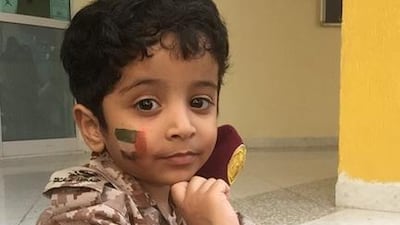DUBAI // “Bubble babies” at risk from the slightest infection as a result of rare genetic conditions will soon benefit from treatment unveiled at the Arab Health Congress on Tuesday.
Gene therapy will provide a lifeline for young children in the Middle East, which suffers from the highest rates of genetic diseases in the world.
The process involves ineffective genes copied and replaced in a patient’s body to help restore the working order of a healthy body.
One child to benefit from the latest developments is four-year-old Khalifa Al Qemzi, who was treated in the UK.
He was one of the first in the region to benefit from gene therapy after severe combined immunodeficiency (SCID) was diagnosed at a hospital in Abu Dhabi.
The rare genetic condition is a primary immune deficiency, causing the child to have very little or no immune system, leaving them exposed to the slightest infection.
Up until recently, bone marrow transplants were the only way to effectively treat such conditions.
Khalifa‘s family were not bone marrow compatible, meaning that performing a transplant from an unrelated or mismatched donor would have been risky.
“Three months after birth, the symptoms of Khalifa‘s genetic immune deficiency started to appear,” said Saeed, his father.
“We then prepared to send Khalifa to the UK after the appropriate hospital for treatment was identified.”
Khalifa was transferred to Great Ormond Street Hospital in London aged 11 months to look into the possibility of gene therapy to treat his condition.
Over the course of a week, bone marrow cells were taken from Khalifa, the faulty gene was corrected, and then given back. Seven months on, Khalifa’s immune cells have come back and his immune system is now functioning properly.
“We thank God and all the staff involved for the treatment they provided Khalifa and the breathtaking results,” Saeed added.
Khalifa now visits the London hospital for regular check-ups but is living a normal life like other children.
His treatment was overseen by Bobby Gaspar, a professor of paediatrics and immunology at the UCL Great Ormond Street Institute of Child Health and director designate for the Zayed Centre for Research into Rare Disease in Children, which is due to open in 2018.
“We have already witnessed gene therapy revolutionise treatment for children with SCID,” he said.
“The condition is sometimes dubbed ‘bubble baby syndrome’ as patients need to live in a sterile environment.”
SCID is more common in the Middle East than elsewhere but it is still rare, affecting about one in 5,000 children in Saudi Arabia.
“This treatment is a more fundamental way to treat these diseases, you are not using external medicines or doing bone marrow transplants using somebody else’s cells. This is using the individual’s own cells,” said Prof Gaspar.
“I believe gene therapy will be able to improve the life and health of many children with life-threatening diseases, where other treatment methods are either ineffective or non-existent.”
nwebster@thenational.ae


